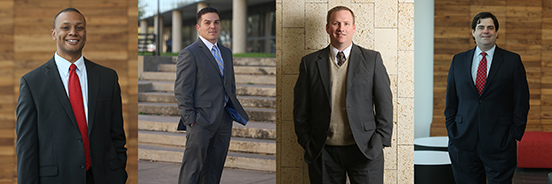Being All You Can Be
Bauer College’s Cougar Fund has a track record of choosing the few and the proud
Published on January 2, 2013
Employer seeks warrior types. Must be aggressive, disciplined and competitive. Must have high tolerance for risk and adapt quickly to new environments.
So, is this theoretical ad recruiting military officers — or Wall Street investors?
Based on a series of interviews with Cougar Fund alumni from the University of Houston’s C.T. Bauer College of Business, people who serve in the armed forces have much in common with financial types. Few and proud are the MBA and MS Finance candidates picked to work on the college’s Cougar Fund, a multimillion-dollar private-investment portfolio that started on Feb. 6, 2002. Like enlisting for duty, the Cougar Fund is a responsibility that is not to be taken lightly. For in the market as on the battlefield, some days you win, and some days you lose.
Here, then, are our stories of four Cougar Fund veterans who once were on the Pentagon payroll:
Joe Ceasar, ’10
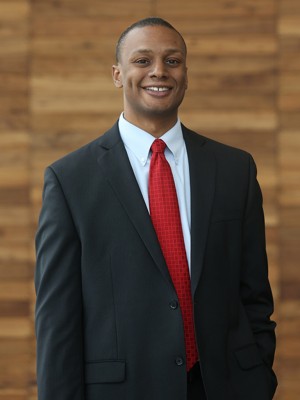
At West Point, Ceasar was told that conflict is cyclic, that every few years “you have a class that’s sure to go to war.” The lifelong Houstonian started his tenure as an active-duty officer just three months before 9/11. By February 2003, he had been deployed as an Air Defense officer on the ground in Iraq. But even before seeing battle, Ceasar — a football and rugby player who studied political science at West Point — had started to dream of a career in finance. After leaving the military, he worked briefly in financial sales roles and quickly discovered that wasn’t for him. “I figured out that what I really wanted to do was be an analyst and a portfolio manager,” Ceasar says. “I was more geared for the research side.” When he heard about the Cougar Fund, “it was exactly what I wanted.” Ceasar earned his MBA in Finance in 2010 and was recently named COO of Houston-based CAZ Investments L.P., where he is also a senior investment analyst and junior portfolio manager. “The Cougar Fund gave me the tools to succeed in a career in investment management, and the overall Bauer experience prepared me to lead within my industry,” Ceasar says. “There’s no way I would be where I am without that experience.”
James Englebrecht, ’07
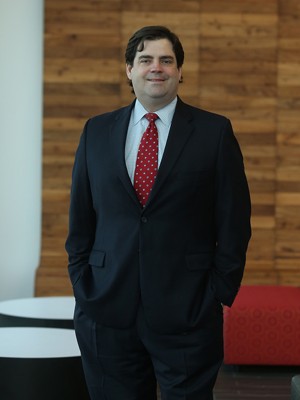
As an Army captain, this West Point grad had plenty of experience giving orders. At 25, he was “managing” some 60 military men — a leadership experience that is rare for someone that age in the business world. Englebrecht, who was recruited by West Point to play football, found that investments appealed to his naturally competitive nature. Yet his undergraduate degree in the American Legal System and Systems Engineering had not equipped him for a role in finance. He needed an MBA, and Bauer College’s Cougar Fund was “right in line” with what he wanted to do. Today, he believes his Bauer College experience gives him an edge. “It provided with me this background that most guys I have run across don’t have, even guys who come from well-respected schools that even have investment programs that are similar to the Cougar Fund.” He also enjoyed the camaraderie and the Cougar Fund’s small class size, which made the transition from West Point easier. “The Cougar Fund had this really great collaborative environment,” said the senior analyst at Paul Comstock Partners who still keeps up with many of his old Cougar Fund buddies. “I’m pretty biased,” he said. “But it’s probably the best thing I have seen at the University of Houston.”
Jason C. Gay, ’12
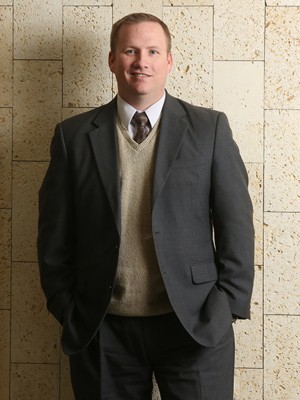
After four years of ROTC at the University of Texas at Arlington and seven years of active duty in the Army, Gay “hadn’t even considered the possibility of having a civilian career.” Until sidelined by a disability, he was happy flying Apache Longbow helicopters in Korea. Though he had to retire sooner than expected, he hasn’t slowed down. "I've been pretty busy," the South Florida native says wryly. Indeed, he recently earned an MS Finance from Bauer College and a JD degree from the University of Houston Law Center. Though he already had an MBA from UT-Arlington when he arrived at UH, he said he lacked an understanding of finance and investments. The Cougar Fund changed that. “I gained a much stronger foundation for what to expect in the real world than I would have originally expected from an academic environment,” Gay says. “In addition to the academic aspects, I got real-world experience where I was working for a real investment fund and learning how people actually make investment decisions.” While at Bauer, he also helped create the BMBA Society’s mentorship program. Currently, the self-described “jack-of-all-trades” is self-employed as a consultant with a tech start-up. He is also CEO of The FYX Inc., a new company that plans to distribute independent films and shorts on the Internet. “There’s really not a good outlet for independent filmmakers to reach the general public,” he said. A free service, The FYX would pay for itself with ads.
Jason Mejia, ’11
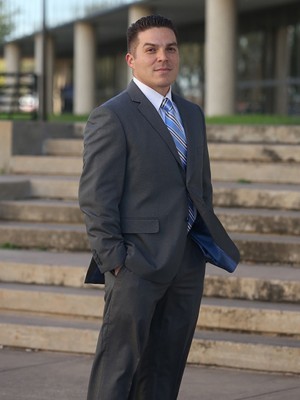
“I always wanted to serve,” says the Los Angeles native, who earned a B.S. degree in chemical engineering while in the Marines Corps Reserve. As Mejia’s engineering career started to click, he got called up for active duty as an infantryman at Camp Pendleton in San Diego. “My unit eventually ended up going [to Iraq], but I never had to go overseas,” he says. Mejia began thinking about getting his MBA while an undergrad at California Polytechnic University-Pomona. “I just felt like I had an opportunity to really showcase my talent in the sense of being able to speak in front of people and communicate,” says the sales supervisor at Puffer-Sweiven. “I thought I had more to offer.” After leaving the Marines, he started the MBA program at the University of Las Vegas but found it too heavily concentrated on the entertainment and gambling industries. Moving to Houston in 2008 to take a job at Puffer-Sweiven, a supplier of services and products for process and flow control, he looked into the city’s MBA programs. He found Bauer College to be an affordable choice with excellent networking potential and a proven track record for cultivating successful CEOs. Getting into the Cougar Fund just sweetened the package. “It’s not just the stocks but trying to evaluate why decisions are being made by companies,” says Mejia. “And then you are responsible for money that private investors are actually putting into the fund. You get that real-world experience. You are applying theory into practice.”
